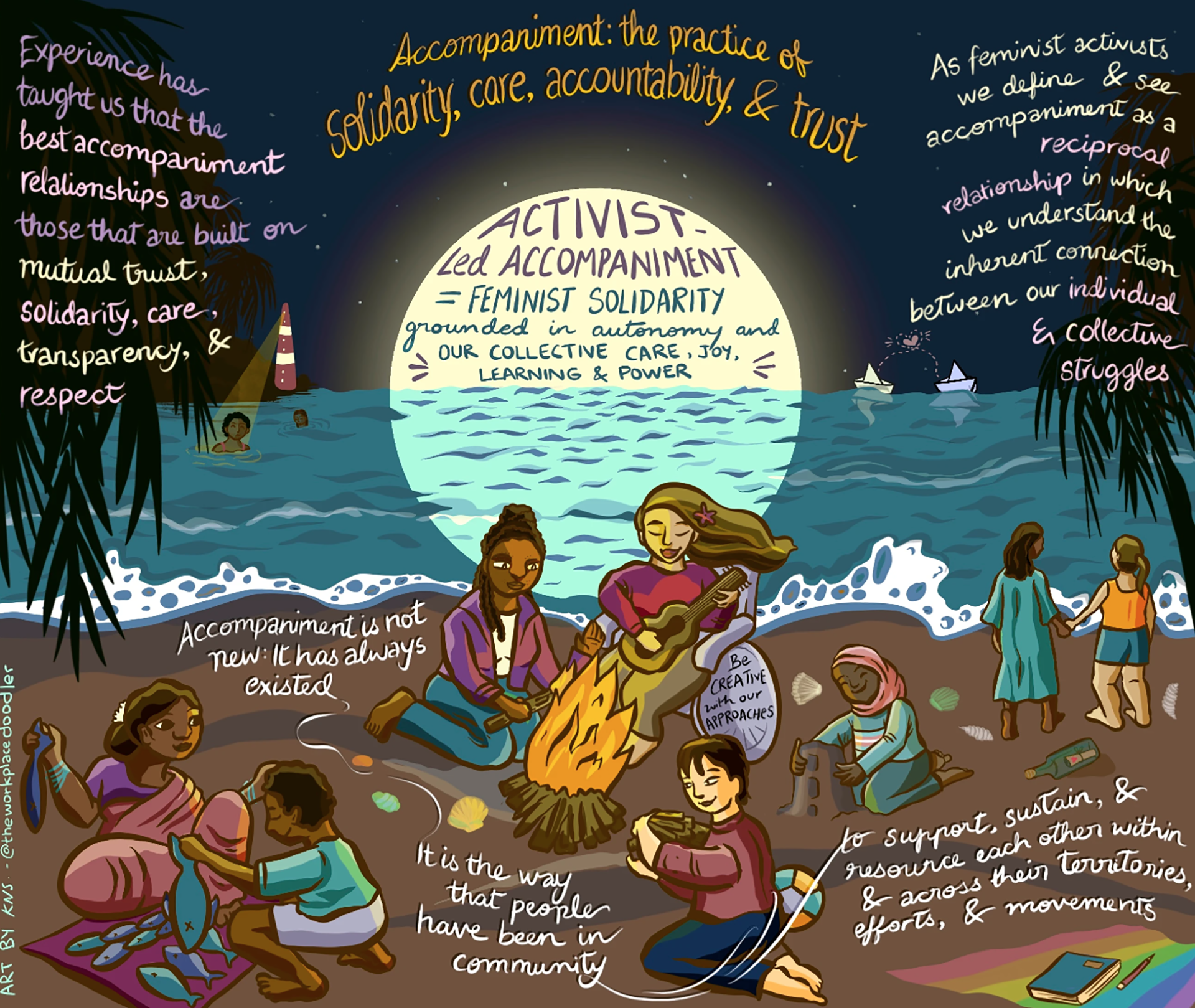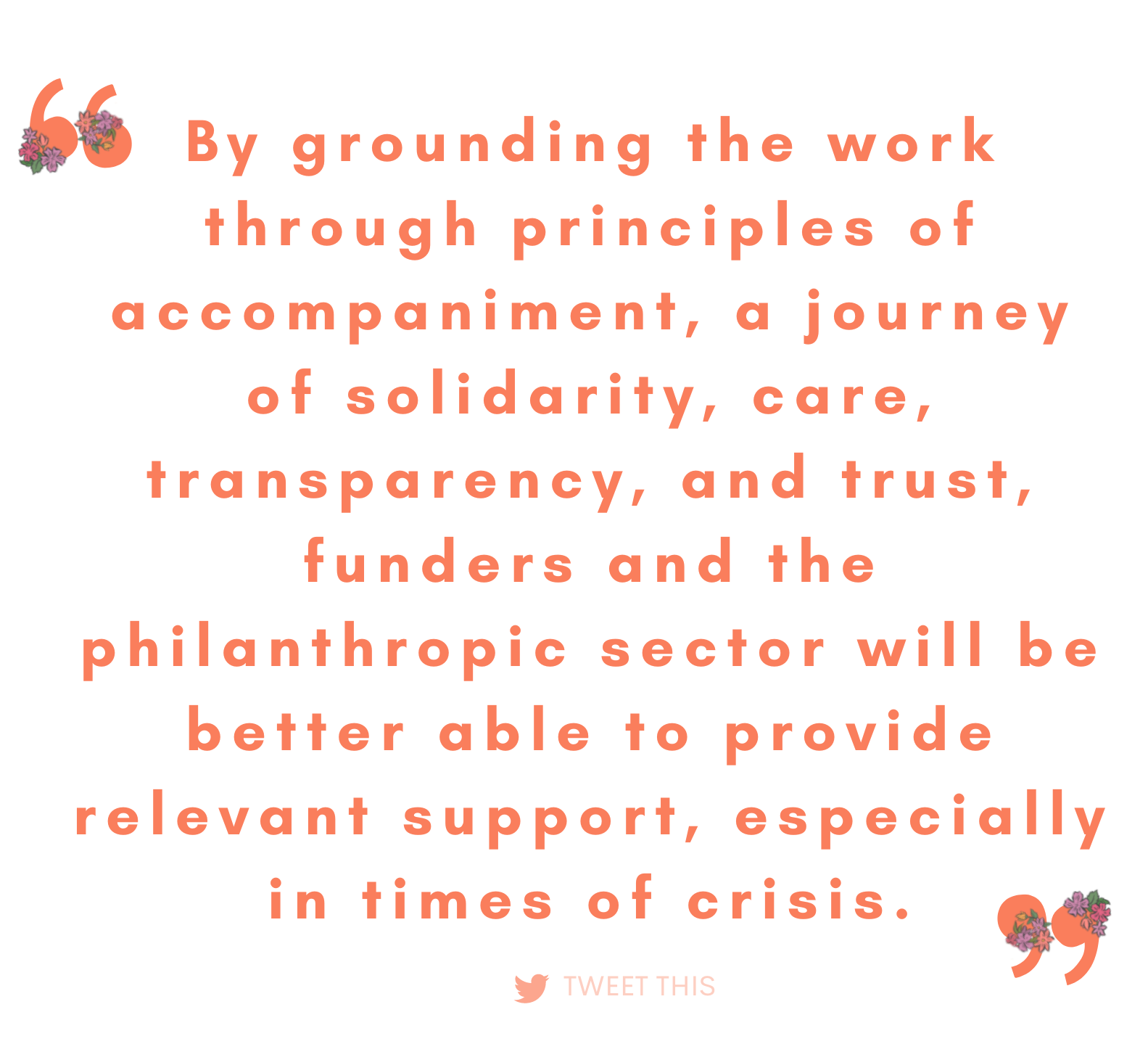
Accompaniment: The practice of solidarity, care, accountability, and trust
Accompaniment is not new. It has always existed. It is the way that people have been in community to support, sustain, and resource each other within and across their territories, efforts, and movements. It is solidarity, care, transparency, and trust. When we look at the definition of accompaniment, or to accompany, it means to “be present or occur at the same time as something else.” In this sense, and literally, to accompany is to show up, to go along with each other on a journey to achieve a collective goal/purpose. It means to be rooted in our individual and collective needs, experiences, and to provide relevant and reciprocal support.
Accompaniment can also be understood as a deep relationship-building process in which the persons/collectives/groups/movements work together and communicate with each other to identify shared needs, goals, plans, and ways to support each other's struggles. This accompaniment is rooted in a relationship of solidarity and respect that trusts everyone’s capacities, experiences, and knowledge. And creates space to communicate with each other to discuss, reflect, and solve problems. As feminist activists, we define and see accompaniment as a reciprocal relationship in which we understand the inherent connection between our individual and collective struggles. Experience has taught us that the best accompaniment relationships are those that are built on mutual trust, solidarity, care, transparency, and respect. As an activist shared at the accompaniment discussion space, it is about "leaving behind the sense of competition with other funders or grantees, and working as a team to tackle our common issues."
There are many ways to do accompaniment. Feminists accompany other women, activists, children, and gender-expansive people, as well as our families, communities, friends, and loved ones. We know that accompaniment demands energy, strategy, and resources. We, both the people that we accompany and ourselves, are living in complicated and precarious contexts, resulting from oppressive and exploitative systems, with constant bursting social crises that make our life and work more difficult and demanding. Additionally, we continue to be targeted and increasingly criminalized by the government. But we are very clear that we must continue to do our accompaniment work, and understand that it is possible because of other feminists and allies across the territories and movements that, through networks of solidarity and support, mobilize resources and action for our collective efforts.
That's why, when we talk about activist-led accompaniment, we highlight the importance of funders, allies, and everyone in the philanthropic sector to organize and guide their work by the needs and strategies of activists and their communities. By grounding the work through principles of accompaniment, a journey of solidarity, care, transparency, and trust, funders and the philanthropic sector will be better able to provide relevant support, especially in times of crisis.
So, what do we mean when we say activist-led accompaniment? It is feminist solidarity that is grounded in autonomy and our collective care, joy, learning, and power. As shared in ‘Sprouting our Collective Wisdom’, “Activist-led accompaniment means that we are deeply rooted in feminist and activist principles of collaboration, self-determination, non-hierarchical and relational learning. It is based on the belief that knowledge should be shared openly, critically, and in the spirit of cooperation rather than competition. Our differences are engines of knowledge building and sharing, and the various types of experiences we have complement each other and bring valuable perspectives. Nobody is superior, nobody is inferior, we don’t perpetuate a hierarchical model of learning between teacher and student, rather one that focuses on sharing knowledge from personal practice, discovering together with curiosity, and learning from each other’s experiences as sources of infinite wisdom. We are many, and we are very diverse – however, many of the struggles we face have very similar roots.” This is why creating learning spaces that cultivate friendships, encourage mutual and active listening, and invite intentional sharing can be extremely powerful, especially through intersectional perspectives and experiences.
HOW DO WE PRACTICE ACCOMPANIMENT:
Community Circles: We define community circles as a small group of people that meet regularly to support each other to achieve the changes they want to see personally, as a collective, organizationally, or on a societal level. It is a community of practice with a clear focus, facilitated by somebody who not only supports each person to go deeper on the issue they bring forth but also to gain skills for coaching others. This spaces an opportunity for activists to network, and to both receive and offer support to other activists. As Gloria, part of the Global Resilience Fund on secondment from Women Win, shared “During the community circles, activists were able to share feelings and situations that they could not share within their collectives. The circles were a safe space for them to feel listened to and listen to others, without providing advice but new perspectives. The activists expressed how this process helped them to get inspired by others’ stories and to feel that they are not alone. Despite being in different contexts, they experienced similar situations and obstacles. Go to pages 18-26 of Sprouting our Collective Wisdom, linked here, to learn more about Community Circles.
Latin American & Caribbean Collective Care Festival: Crises are not new. The ones that we continue to experience are a product of the systemic injustices of the world – the ongoing COVID-19 pandemic being no different. As a result, we continue to experience painful trauma that is created by these crises which can drown us in hopelessness, chaos, and make us feel alone; make us think that we cannot imagine or dream about the future. And, though it is difficult to carry forth, we know that we are the seeds that sprout the revolution. One where we resist by connecting with the wisdom of our ancestors, communities, and territories. One that is rooted in our collective care and power by reminding ourselves to breathe, pause, learn, reflect, and reclaim our joy. Committed to a revolution that seeks our sustained healing, solidarity, and liberation while honoring our territory and wisdom, we, a group of Feminist Latin American and Caribbean Activists, co-organized and curated in 2021 the Festival Cuidarnos, Sostenernos (Caring, Sustaining Festival) that brought together over one hundred feminist girls and young activists every Friday and Saturday from October 15th-30th. Go to pages 40-43 of Sprouting our Collective Wisdom, linked here, to learn more about the festival.
Co-create community learning and discussion spaces as a form of accompaniment: In the Global Resilience Fund and all of Purposeful’s grantmaking, we have challenged the “traditional reporting, evaluation, and monitoring" practices that tend to be extractive and further exacerbate the same injustices we are hoping to eradicate and dismantle. By actively experimenting through the co-creation of community spaces for shared and collective, we are able to support our communities in ways that are relevant, useful, and nourish the ecosystem at large. In June, we hosted a community space focused on discussing and reflecting on the politics and practice of activist-led accompaniment. Through this discussion, we were able to further our belief in the importance of these discussion spaces as new learning always emerges to support us in the way we provide and receive accompaniment. As an activist shared, "allyship [and our efforts to show up for each other] is not a one-time commitment but a continuing journey across all the seasons."
[Graphic recording of the accompaniment community discussion space held on the 2nd of June, 2022. Click here to view the text-only version of the graphic recording.]
FUNDER RECOMMENDATIONS
Feminist activists and feminist activist-funders need accompaniment relationships built on trust and mutual respect. As outlined in the GRF’s most recently published report, “Sprouting our Collective Wisdom”, the community open space dialogue focused on accompaniment, and through deeply collaborative global conversations with many activists, we believe that “accompaniment requires funders to be committed to embarking on a journey of mutual learning built on trust.” With this in mind, we recommend that funders:
Resource activist-led accompaniment, especially so many efforts that are already happening. It is not always necessary to create new programs but to support the efforts taking place now. This also means supporting the care of the activists leading those efforts, as they will do this accompaniment in addition to all of their activism and responsibilities.
Move beyond accompaniment models that prioritize only what can make a grantee more effective (as determined by the funder) but create accompaniment practices that focus on amplifying the causes and efforts which are important, and led by grantee partners.
Recognize that many activists are facing multiple crises, often simultaneously. Funders have a responsibility to be true allies, especially when activists work within contexts where their work can be seen as criminal. Wherever possible, go beyond traditional grantmaking to use your social and economic power to leverage long-term support towards the safety and ongoing wellbeing of activists.
Challenge the idea of what is required versus what is actually necessary. Accompaniment or capacity building developed by funders, in some places, has become one more layer of work that activists must complete in order to be deserving of funding, but that doesn’t have to be the case.
Be more creative with funder approaches. Shift funding structures and operations so that they can actually welcome and include activists' contributions and participation in ways that are accessible.
As funders, acknowledge your accountability - Our position of power comes with the responsibility to be accountable to activists and their communities, not to the philanthropic sector. A sector that was developed from the systemic injustices that allowed for the exploitation of our communities. It is part of a funder's responsibility to shift power and move the resources in creative ways that ensure the current and long-term sustainability of our efforts.
Daniela Moisa is a young anarchy-feminist from El Salvador she has been a feminist activist since she was a teenager, advocating for safe abortion for all girls, teenagers, and women in the region. She also provides information, care, and accompaniment to children, young urban women and marginalized communities in the country, facilitating sexual and reproductive health and rights education, feminism, and art workshops. Daniela is also a scenic and graphic artist who uses her performance and illustrations to speak out on injustices against women.
Gabrielle Bailey is a Global Resilience Fund’s Activists Panelist and Children's Rights Innovation Fund’s Grantmaking Innovation Officer. She first started in local grassroots activism and later in grantmaking panelist roles for the “With and For Girls Collective”, and the “Global Resilience Fund”. She has represented her peers, organization, Barbados’ youth, and feminist movements globally, advocating for gender justice, LGBTQ+ rights, environmental sustainability, and youth development. At CRIF, she is working to ensure that the grantmaking policies and actions truly place power and resources in the hands of youth activists in ways that uphold the organisation’s values and inspire change within the philanthropic community. She is passionate about mental health, and believes in a more equitable ‘tomorrow’ for us all, and is proud to hold hands with others to work toward that goal, through focused, determined, and joyous resistance.
GRATITUDE
This piece was illustrated by Kruthika NS, lawyer and social justice artist @theworkplaceDoodler, and inspired by reflections and conversations at the Sprouting our Collective Wisdom discussion spaced focused on discussing the politics and practice of activists-led accompaniment.






